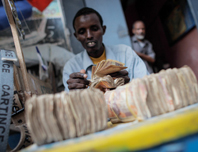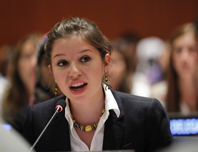DESA News
Volume 18, No.06 - June 2014
Trends and analysis
 On 5 June 2014, the UN Economic and Social Council (ECOSOC) will hold a special meeting to consider international cooperation in tax matters including, as appropriate, its contribution to mobilizing domestic financial resources for development and the institutional arrangements to promote such cooperation.
On 5 June 2014, the UN Economic and Social Council (ECOSOC) will hold a special meeting to consider international cooperation in tax matters including, as appropriate, its contribution to mobilizing domestic financial resources for development and the institutional arrangements to promote such cooperation.
Participants will include representatives from national tax authorities and major international organizations active in the tax area, such as the IMF, World Bank, OECD, the Inter-American Centre of Tax Administrations (CIAT) and the African Tax Administration Forum (ATAF).
Following a short opening plenary featuring presentation by the Chair of the UN Committee of Experts on International Cooperation in Tax Matters on the outcome of the 9th session of the Committee (Geneva, 21-25 October 2013), the meeting will include three panel discussions on: (1) Current issues on the agenda of international organizations; (2) Current issues in domestic resource mobilization for development: Base erosion and profit shifting (BEPS); and (3) Extractive industries taxation issues for developing countries.
Preceding the ECOSOC meeting, UN DESA’s Financing for Development Office (FfDO) is organizing, in cooperation with the OECD Center for Tax Policy and Administration (CTPA) a workshop on “Tax Base Protection for Developing Countries” with the participation of representatives of developing countries.
This meeting is part of a project, undertaken by FfDO, which focuses on strengthening the capacity of developing countries to increase their potential for domestic revenue mobilization through protecting and broadening their tax base. The work will be focused on selected set of topics of particular relevance to developing countries, at the relevant stage of their capacity development, with a view to outlining a range of practical and feasible solutions, which could be implemented by these countries, resulting in increased tax revenues. The final outcome of the project will be a UN handbook, comprising a collection of papers developed in a novel demand-driven manner taking into account inputs from developing countries.
This workshop will provide a broad overview and update on the UN and OECD work in this area and then focus on the following topics: (1) Preventing tax treaty abuse; (2) Taxation of services (including taxation of fees for technical services); (3) Protecting the tax base in the digital economy; and (4) Tax incentives and tax base protection issues.
For more information:
ECOSOC Special Meeting on International Cooperation in Tax Matters
Workshop on Tax Base Protection for Developing Countries
 A Facebook chat will be held on 12 June from 10 am to 11 am EDT, to discuss the latest updates on global growth and the risks and uncertainties facing the world economy identified in the recently released mid-year update of the World Economic Situation and Prospects 2014.
A Facebook chat will be held on 12 June from 10 am to 11 am EDT, to discuss the latest updates on global growth and the risks and uncertainties facing the world economy identified in the recently released mid-year update of the World Economic Situation and Prospects 2014.
Economists from the Global Economic Monitoring Unit of UN DESA’s Division for Development Policy and Analysis will be on hand to answer questions about their latest report, the World Economic Situation and Prospects as of mid-2014 launched on 21 May. The global growth trajectory was modified to 2.8 per cent in 2014 and 3.2 per cent in 2015, slightly lower than previously forecast in the World Economic Situation and Prospects 2014 released in January.
The recovery in the developed economies will continue, but the growth prospects for the developing economies and the economies in transition have been revised downward, largely because of challenging economic and/or political conditions in a number of countries in these two latter groups.
You can post your questions at http://bit.ly/AskWESP2014 or on Twitter @UNDevelopPolicy using the hashtag #AskWESP2014
For more information: World Economic Situation and Prospects as of mid-2014
 UN DESA’s Division for Social Policy and Development and the United Nations Educational, Scientific and Cultural Organization (UNESCO), will organize an Expert Group Meeting on the theme “Youth Civic Engagement: Enabling Youth Participation in Political, Social and Economic Life” at UNESCO Headquarters in Paris on 16-17 June.
UN DESA’s Division for Social Policy and Development and the United Nations Educational, Scientific and Cultural Organization (UNESCO), will organize an Expert Group Meeting on the theme “Youth Civic Engagement: Enabling Youth Participation in Political, Social and Economic Life” at UNESCO Headquarters in Paris on 16-17 June.
Civic engagement is increasingly recognized as an important component of youth development because it can help build human and social capital. The practice of civic engagement has an important impact in educating young people about their rights and responsibilities as citizens and allowing them to develop skill sets that are valuable to them as they undergo the transition to adulthood. Civic engagement is also perceived as a driving force for community and national development as it enables youth to unleash their potential and contribute to the development of their societies.
The event in Paris will bring together experts and representatives of youth organizations, academia, representatives of Member States, United Nations entities, and intergovernmental organizations to discuss the ways in which youth civic engagement can be an enabler for political, social and economic participation, as well as to examine current opportunities and challenges affecting such potential. These topics will be considered under the framework of both the World Programme of Action for Youth and the UN System-Wide Action Plan on Youth which respectively incorporate youth participation and youth civic engagement among their priority areas for action.
For more information: UN DESA’s Division for Social Policy and Development
 The Intergovernmental Committee of Experts on Sustainable Development Financing (ICESDF) held its fourth session at UN Headquarters in New York on 12-16 May.
The Intergovernmental Committee of Experts on Sustainable Development Financing (ICESDF) held its fourth session at UN Headquarters in New York on 12-16 May.
While this was a closed session, an interactive multi-stakeholder dialogue took place on Monday, 12 May. The Co-Chairs of the Committee, Ambassador Pertti Majanen from Finland and Mr. Mansur Muhtar from Nigeria, also gave an open briefing on the Committee’s work to date on Friday, 16 May.
“I am pleased to report that we have made significant progress over the last few days”, said Mr Muhtar at the open briefing. He mentioned that the Committee had finished discussing the zero draft of its report proposing options on an effective sustainable development financing strategy, as tasked by the Rio+20 Conference. “We are confident that we will continue our work in this very constructive atmosphere and expect to finalize the report at our last session in August,” he said.
The report will be structured around the mobilization and effective use of (1) domestic public resources for sustainable development; (2) domestic private financing for sustainable development; (3) international private finance for sustainable development; (4) International public financing for sustainable development; and (5) blended financing for sustainable development. The sixth section will deal with options for an institutional framework for sustainable development financing. This will be followed by a conclusion that will hone in on key actions and options for a sustainable development financing strategy.
Among the findings of the Committee was that there are both enormous financing needs, but also untapped financial flows. If only a portion of these were redirected, financing needs could be met. “So the challenge is how to incentivize these flows, how to ensure that they are channelled to support sustainable development,” said Mr. Muhtar.
Reporting from the multi-stakeholder dialogue, he said that a wide range of stakeholders had emphasized the importance of “a unified financing framework for the post-2015 development agenda, including the role of the private sector, as well as its limitations, and the importance of incorporating human rights.”
Looking ahead, Mr. Muhtar said that the Committee’s outreach activities would continue, with meetings scheduled for 2 June at the Islamic Development Bank in Jeddah, Saudi Arabia, where the potential of Islamic finance in sustainable development financing will be explored, and on 10-11 June in Jakarta, Indonesia, which will be hosted by the Government of Indonesia and the UN Economic and Social Commission for Asia and the Pacific (ESCAP) and will focus on the challenges in sustainable development financing in the Asia-Pacific region.
For more information:
Fourth session of the Intergovernmental Committee of Experts on Sustainable Development Financing
 On 5 June 2014, the UN Economic and Social Council (ECOSOC) will hold a special meeting to consider international cooperation in tax matters including, as appropriate, its contribution to mobilizing domestic financial resources for development and the institutional arrangements to promote such cooperation.
On 5 June 2014, the UN Economic and Social Council (ECOSOC) will hold a special meeting to consider international cooperation in tax matters including, as appropriate, its contribution to mobilizing domestic financial resources for development and the institutional arrangements to promote such cooperation. 


